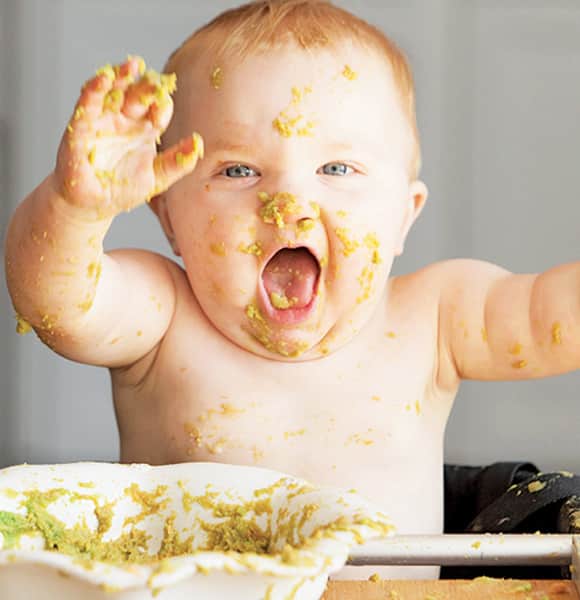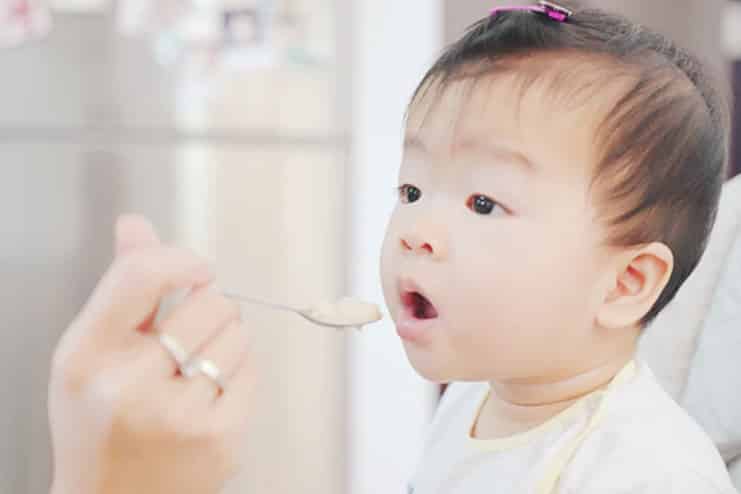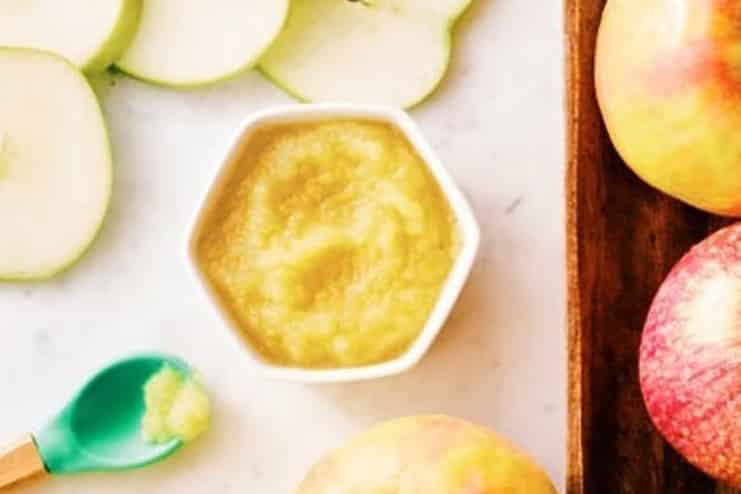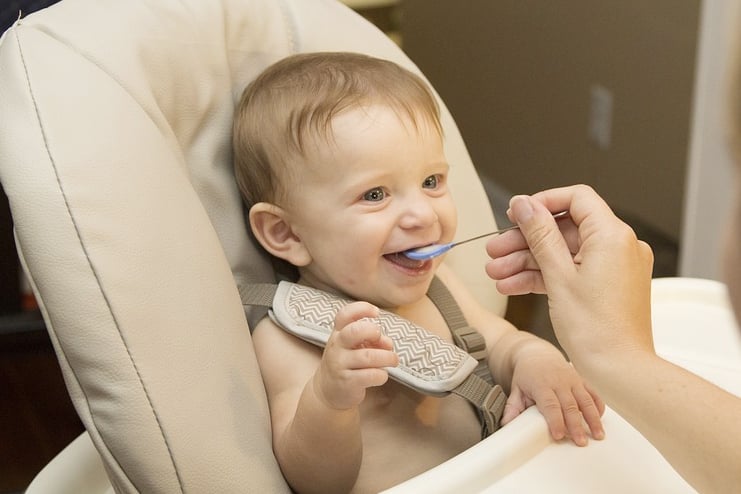Are you confused about how to feed your baby solid food? When to introduce first solid food for baby? Are they ready for the transition to solid food? I can understand the questions revolving around your mind. But trust me, just relax.
Solid foods are an important and crucial part of baby life. It helps the baby open up to a brand new world of flavor and texture that makes the baby grow in a healthy and stronger way.
Find out when and how to make the transition from breast milk or formula to solid foods at this article. Just go through it and clear all your doubts and confusion about the baby solid food introduction schedule.
What Are The Solid Food For Babies?

Solid foods for babies are more often described as foods that act as a transition of the baby from milk to adult food after a phase of time.
At about 4- 6 months, nutrition from milk, either formula or breast milk, is not sufficient for the baby’s nutritional value.
So, solid foods need to be added to the baby’s diet in order to ensure healthy growth and development of a baby.
Solid foods give enough iron and other essential nutrition for the growth and development of a baby.
When To Start Solid Food For Babies?

According to the American Academy of Pediatrics, the baby should be breastfed for at least six months. Hence after that, the baby can be started with solids food (R). The American Academy of Allergy, Asthma, and Immunology state that infants can handle solids beginning at four months (R)
As per Dr.Frank R.Greer (R), an infant nutrition researcher at the University of Wisconsin, solid food should be introduced when infants are developmentally ready, which occurs sometime between four and six months.
Greer said the only infants who should not be introduced to solid food until after six months are those few who are not developmentally ready.
It is a segment of time that is regarded for the babies to stop using their tongue in order to push food out of the mouth. This is also a time frame where the baby develops the coordination to move solid food.
The baby starts it from the front of the mouth towards the back in order to swallow the food. So it is advisable by the experts to start introducing solid food to babies.
How To Know When The Baby Is Ready For Solid Food?

There are many signs and symptoms to look for that will indicate about your baby whether they are ready to begin the journey of solid foods or not.
Signs That Your Baby is Ready For Solids Includes-
- The baby has a good head and neck control and can sit upright when supported.
- The baby shows an interest in food, for example, by looking at what’s on your plate
- The baby could reaches out for your food
- The baby opens his mouth when you offer him food on a spoon.
- The baby can hold food in their mouth and is willing to chew.
- The baby could co-ordinate their eyes, hands, and mouth so they can look at the food, pick it up and put it in their mouth by themselves
- The baby can swallow food (rather than spit it back out)
Before 6 months it is a rare case when the baby is ready for the baby solid food schedule. Refer to the pediatrician for advice before you start first solid food for baby.
Tips Before Introducing Solid Food to the Baby:

- Do not start offering new food daily to the baby. Wait for two or three days to spot allergic reactions like diarrhea, vomiting or rash in your baby.
- Do not ignore the food when the baby rejects to take it for the first time. Try it for 8 to 10 times because there are chances that your baby accepts it after several days.
- Do not start directly with rice cereal as it is unlikely to trigger any of the allergic reaction.
- Do not offer veggies first. Instead, start feeding with fruit.
What Are The First Solid Food For A Baby?

There is no medical evidence about introducing solid foods in any particular order. For most babies, it does not even matter what the first solid foods are. However many pediatricians will recommend starting vegetables before fruits. Here are some of the best solid food for the baby-
Stage 1 Baby Foods
- First foods to offer
- Have a single ingredient and pureed
- Easy to monitor any food allergies
Stage 2 Baby Foods
- Similar to stage 1 foods
- More than a single ingredient (combinations of fruits or vegetables)
- Strained instead of pureed
Stage 3 Baby Foods
- Mashed and more textured than pureed foods
- Contains bits and chunks of veggies or meat
- Baby weans quickly to table food
1. Fruits:
Who doesn’t love fruits? Babies especially do. Anything made of fruits, kids simply love it. Whatever you give in fruits, do make sure of one thing that they are properly ripe, and washed well before peeling.
You can give some of the fruits like-
- Bananas
- Apple, plums, pears, pineapple, peaches, and apricots, etc.
- Avocado is regarded as one of the best fruits rich in fiber for babies.
2. Vegetables:
Before giving any sort of fresh vegetables, make sure it is washed, peeled and cooked. It should be tender and smooth while eating it.
Frozen veggies should be avoided as solid food for the baby. Just add a pinch of salt in it while preparing as the baby will simply love it, you can give them-
- Baked or boiled sweet potatoes
- Mashed white potatoes
- Baby carrots, green beans, peas, squash, green raw papaya, pumpkin, etc.
3. Meat and Fish:
Babies often prefer well cooked chicken, which is soft and easy to eat when shredded. Fish act as a good source of omega 3 for the baby diet.
4. Beans and Legumes:
You can feed the baby with some skinless beans as they are rich in high fibers. Don’t use any canned beans which are unseasoned.
5. Grains and Cereals:
The first foods served to babies who are not breastfeeding are the iron-fortified cereal. This is due to the need the extra iron to the babies.
But, as per the research and studies, breastfed babies are rarely anemic as the iron in human milk is well-utilized.
Whole grain cereals, bread and crackers are the most nutritious. While using cereals, make sure that they only have one ingredient and use either water or your own milk for mixing.
As per the expert and studies say that once the baby has reached six months, you can start to offer him cooled, boiled water as it is now easy to digest the food.
Make sure you include this in a cup at mealtimes or at other times during the day which will be easy to digest the food.
The fluids other than breast milk or formula aren’t really needed at particular at this age. You can avoid this, but before stopping the formula milk just do consult to the doctor or pediatrician once.
How To Start Solid Foods For Baby?

Here are some ways which you can help you to start solid food for the baby –
1. Feed The Baby With Spoon:
Start feeding a baby with a help of a spoon or make your hand as a spoon for your baby, Never feed solid food to the baby in a feeding bottles as it can lead to choking hazards.
2. Try New Foods More Than Once:
You should try the same food for at least 2 -3 days as per the meals time as the baby ‘s taste will evolve. Trying a new food for more than once plays a great role.
3. Start Slowly:
Start mealtime with a little breast milk or formula, then give some solid food to your baby. It should be a mix and match combination between the solid and breast milk or formula milk. Start off with introducing solids at one meal a day, then slowly work your way up.
4. Try Food In Different Form:
The presentation of solid food matters here. If the baby doesn’t like food pureed, then try it with some kind of mashed food of that fruits or vegetables. It may be a case of trial and error until you are able to figure out the taste and texture of your baby food preference.
Solid Foods Not To Give Baby:
There are few foods that should be avoided for a 4-6 months baby. These are as follows-
1. Honey:

Honey should be avoided for a 6-month-old baby food chart. It has bacteria that can cause infection, known as infant botulism. Honey especially affects the baby growth and development of teeth
2. Some Type Of Fish:

There are some types of fishes which should be avoided for a 6-month-old baby. Fishes such as swordfish or marlin and shark take a back seat for a 6-month baby as it contains a high level of mercury.
3. Egg:

Before giving eggs to babies, do check it whether it goes well with the babies or not. Check with it doesn’t inflict any allergies to the babies. Always make sure that the egg is well cooked solid both with the white and yellow portion of the egg.
4. Whole Nuts:

Try to avoid giving whole nuts to the baby aged under five as it causes choking.
5. Salt:

Studies have proved that the baby should have less than 1 gm of salt a day. So try to avoid adding salt to the baby food as the kidney can’t tolerate it.
6. Sugar:

Sugar rich food is bad for a 4-6 month baby. It is harmful to the babies teeth as it can lead to cavity. Give fruits with natural sugars but not ice creams, sugary custards, biscuits or sweets.
7. Milk:

For the first year, stick to breast milk or formula milk. The baby should not be given any form of milk that comes in a packet. This is because it is difficult for the baby to digest. It may cause allergic reactions like diarrhea.
8. Carbonated Drinks:

The carbonated drinks such as Colas and sodas should be strictly avoided to the babies as it contains a high concentration of sugar, sodium and artificial flavorings. These ingredients are not good for babies. The gas used to carbonate such type of drinks can cause upset tummies in babies.
What To Do If Your Baby Is Refusing Solid Food?
It is obvious that some babies will refuse solid food. They may not like the texture and taste of the solid food. Here comes with an important things which you should do when your baby does not want to have solid food is that you should give them plenty breast milk or formula milk. Make sure you don’t force them to eat solid food.
Just start slowly in starting baby on the solid chart. Start mealtime with a little breast milk or formula, then give some solid food to your baby. It should be a mixed and match combination between the solid and breast milk or formula milk. Start off with introducing solids at one meal a day, then slowly work your way up.
Introducing solid food to a baby is a crucial step in the motherhood. So you have to take care of every single bit of it. Try to follow this baby solid food guide for your little one and keep your baby in a healthy way through their developmental stages of life.








































